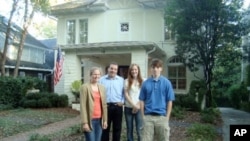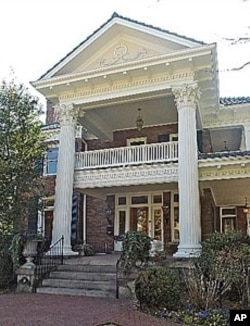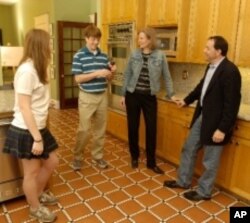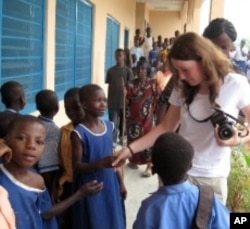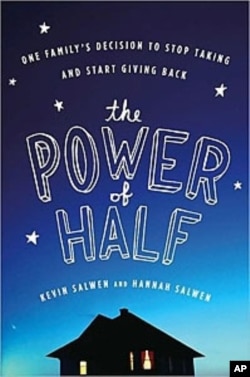One day in 2006, Hannah Salwen and her father, Kevin, stopped at a traffic light in downtown Atlanta. The 14 year old remembers looking out the window. "And I saw this homeless man sitting on the sidewalk, holding up a sign that said, 'Homeless. Please help.'
And then, on my right, I saw a man in a Mercedes coupe." She looked back and forth between the two extremes, the 'haves' and the 'have nots' and then turned to her father. "I said to my dad, 'You know, if that guy - to the right, the man in the Mercedes - didn't have such a nice car, then the man, the homeless man, would have a meal,'" Hannah recalls.
Coming to grips with the world's inequities
That evening, she was still angry about what she'd seen. Her dad, a writer and entrepreneur, tried to explain that their family was really trying to make a difference. He pointed out that they were out in the community doing good work, volunteering at the local food bank and homeless shelter.
But that wasn't enough for Hannah. "I'm looking across the table," Kevin recalls, "and all I could feel is Hannah's eyes staring at me with one word shining in them, and it's, 'This is lame, totally lame.'"
Her mother, Joan, suggested, a bit facetiously, "Oh, what do you want to do? Do you want to sell the house?" And Hannah replied, 'Yeah! That is what I want to do.'"
A dramatic move
So the Salwens sold their seven-bedroom mansion and bought a house one-half its size. They donated half of the profits to charity.
To Hannah, the house was a tool for her charitable work. But her father wasn't convinced, until he looked around and saw how many possessions the family had that they really didn't need. And he says he realized something else. "This could be kind of fun. I wondered what this process would be like and I wondered what it would do. It was kind of a little bit of journey into the unknown," Kevin says.
Since everyone in the family including Hannah, her younger brother Joseph and her parents had to give up something in order to downsize, Joan thought each ought to have an equal say in what would happen to the proceeds from the house sale. It would be one person, one vote.
It took more than a year for the family to choose a charity to support. On Sunday mornings, they'd meet over breakfast to discuss projects. Finally, they chose the Hunger Project. Kevin says its philosophy matched the family's thinking. "What we loved about the Hunger Project was that their methodology was 'We trust in the people in these communities to build their own futures.'"
Trading stuff for togetherness
The family is adjusting to life in a smaller house. There's no longer a separate room for the ping-pong table and the dining room table doubles as a computer work station. But still, Kevin thinks they got a good deal.
"I think we're a family that honestly set out to do a little bit of good. And we are doing a little bit of good, but the good we did for ourselves, I think, in some ways dwarfs the good for mankind or for other humans on this planet," he says.
In thinking about philanthropy, Kevin says his family is committed to the idea of half, in part because it is easy to measure.
"I think a lot of us look at the world and say, 'I ought to be doing more.' But 'more' is such a mushy and amorphous concept that we end up being paralyzed by it. And so, what we decided to do is say, 'Look, half is completely measurable.'"
The power of half
Since their book was published earlier this year, the Salwens have been touring the country, appearing on television and speaking at schools and libraries about the power of half. The response has been positive, they say, and they're looking forward to seeing others start their own 'half' projects.
Hannah says it's something anyone can do. "Everyone has more than enough of something they could sacrifice," she says.
Father and daughter have written a book, "The Power of Half", they hope will inspire others. "Obviously not many people are going to sell their house," Hannah admits, "but there are so many things, so many opportunities that you can be a part of. If your family watches four hours of TV a week you could cut that down to two and use those two hours to help in a homeless shelter."
Hannah was delighted. "It felt really good to know that if [my brother and I] had something to say, that my parents would be listening and that they would actually take it into consideration and not just say, 'Okay they don't know what they're talking about because… whatever.'" Hannah remembers that moment clearly. "I said 'I don't want to be a family that just talks about doing something. I want to really get out there and I want to make a difference.'"




